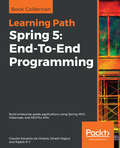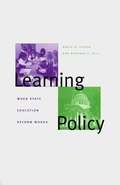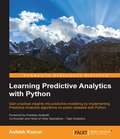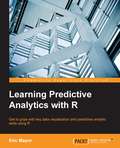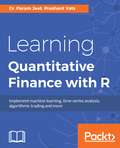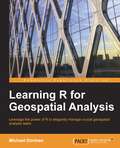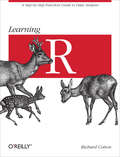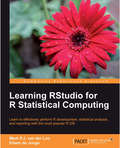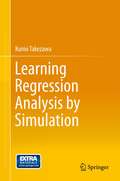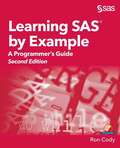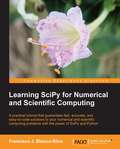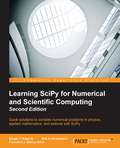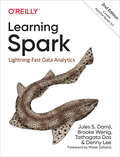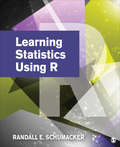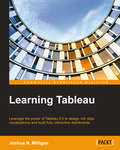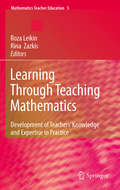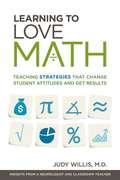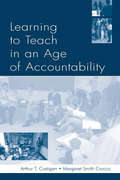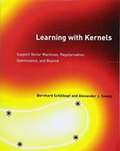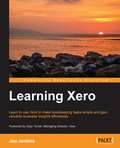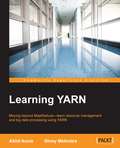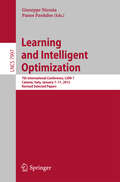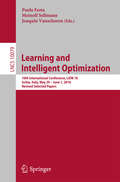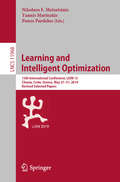- Table View
- List View
Learning Path - Spring 5: End to End Programming
by Rajesh R V Dinesh Rajput Claudio Eduardo OliveiraIf you're a developer starting out with Spring, then this learning path will help you learn about the new Spring 5.0 framework concepts followed by their implementation in Java and Kotlin. If you are an experienced Spring developer, then this Learning Path will enable you to gain insights into the new features added in Spring 5.0.
Learning Policy: When State Education Reform Works
by David K. Cohen Heather C. HillThis book reports on one of the more significant school-improvement policies in late-twentieth-century America: California's decade-long effort to change and improve mathematics teaching in the state's public schools.
Learning Predictive Analytics with Python
by Ashish KumarGain practical insights into predictive modelling by implementing Predictive Analytics algorithms on public datasets with Python About This Book * A step-by-step guide to predictive modeling including lots of tips, tricks, and best practices * Get to grips with the basics of Predictive Analytics with Python * Learn how to use the popular predictive modeling algorithms such as Linear Regression, Decision Trees, Logistic Regression, and Clustering Who This Book Is For If you wish to learn how to implement Predictive Analytics algorithms using Python libraries, then this is the book for you. If you are familiar with coding in Python (or some other programming/statistical/scripting language) but have never used or read about Predictive Analytics algorithms, this book will also help you. The book will be beneficial to and can be read by any Data Science enthusiasts. Some familiarity with Python will be useful to get the most out of this book, but it is certainly not a prerequisite. What You Will Learn * Understand the statistical and mathematical concepts behind Predictive Analytics algorithms and implement Predictive Analytics algorithms using Python libraries * Analyze the result parameters arising from the implementation of Predictive Analytics algorithms * Write Python modules/functions from scratch to execute segments or the whole of these algorithms * Recognize and mitigate various contingencies and issues related to the implementation of Predictive Analytics algorithms * Get to know various methods of importing, cleaning, sub-setting, merging, joining, concatenating, exploring, grouping, and plotting data with pandas and numpy * Create dummy datasets and simple mathematical simulations using the Python numpy and pandas libraries * Understand the best practices while handling datasets in Python and creating predictive models out of them In Detail Social Media and the Internet of Things have resulted in an avalanche of data. Data is powerful but not in its raw form - It needs to be processed and modeled, and Python is one of the most robust tools out there to do so. It has an array of packages for predictive modeling and a suite of IDEs to choose from. Learning to predict who would win, lose, buy, lie, or die with Python is an indispensable skill set to have in this data age. This book is your guide to getting started with Predictive Analytics using Python. You will see how to process data and make predictive models from it. We balance both statistical and mathematical concepts, and implement them in Python using libraries such as pandas, scikit-learn, and numpy. You'll start by getting an understanding of the basics of predictive modeling, then you will see how to cleanse your data of impurities and get it ready it for predictive modeling. You will also learn more about the best predictive modeling algorithms such as Linear Regression, Decision Trees, and Logistic Regression. Finally, you will see the best practices in predictive modeling, as well as the different applications of predictive modeling in the modern world. Style and approach All the concepts in this book been explained and illustrated using a dataset, and in a step-by-step manner. The Python code snippet to implement a method or concept is followed by the output, such as charts, dataset heads, pictures, and so on. The statistical concepts are explained in detail wherever required.
Learning Predictive Analytics with R
by Eric MayorGet to grips with key data visualization and predictive analytic skills using R About This Book * Acquire predictive analytic skills using various tools of R * Make predictions about future events by discovering valuable information from data using R * Comprehensible guidelines that focus on predictive model design with real-world data Who This Book Is For If you are a statistician, chief information officer, data scientist, ML engineer, ML practitioner, quantitative analyst, and student of machine learning, this is the book for you. You should have basic knowledge of the use of R. Readers without previous experience of programming in R will also be able to use the tools in the book. What You Will Learn * Customize R by installing and loading new packages * Explore the structure of data using clustering algorithms * Turn unstructured text into ordered data, and acquire knowledge from the data * Classify your observations using Naïve Bayes, k-NN, and decision trees * Reduce the dimensionality of your data using principal component analysis * Discover association rules using Apriori * Understand how statistical distributions can help retrieve information from data using correlations, linear regression, and multilevel regression * Use PMML to deploy the models generated in R In Detail R is statistical software that is used for data analysis. There are two main types of learning from data: unsupervised learning, where the structure of data is extracted automatically; and supervised learning, where a labeled part of the data is used to learn the relationship or scores in a target attribute. As important information is often hidden in a lot of data, R helps to extract that information with its many standard and cutting-edge statistical functions. This book is packed with easy-to-follow guidelines that explain the workings of the many key data mining tools of R, which are used to discover knowledge from your data. You will learn how to perform key predictive analytics tasks using R, such as train and test predictive models for classification and regression tasks, score new data sets and so on. All chapters will guide you in acquiring the skills in a practical way. Most chapters also include a theoretical introduction that will sharpen your understanding of the subject matter and invite you to go further. The book familiarizes you with the most common data mining tools of R, such as k-means, hierarchical regression, linear regression, association rules, principal component analysis, multilevel modeling, k-NN, Naïve Bayes, decision trees, and text mining. It also provides a description of visualization techniques using the basic visualization tools of R as well as lattice for visualizing patterns in data organized in groups. This book is invaluable for anyone fascinated by the data mining opportunities offered by GNU R and its packages. Style and approach This is a practical book, which analyzes compelling data about life, health, and death with the help of tutorials. It offers you a useful way of interpreting the data that's specific to this book, but that can also be applied to any other data.
Learning Quantitative Finance with R
by Dr Param Jeet Prashant VatsImplement machine learning, time-series analysis, algorithmic trading and more About This Book • Understand the basics of R and how they can be applied in various Quantitative Finance scenarios • Learn various algorithmic trading techniques and ways to optimize them using the tools available in R. • Contain different methods to manage risk and explore trading using Machine Learning. Who This Book Is For If you want to learn how to use R to build quantitative finance models with ease, this book is for you. Analysts who want to learn R to solve their quantitative finance problems will also find this book useful. Some understanding of the basic financial concepts will be useful, though prior knowledge of R is not required. What You Will Learn • Get to know the basics of R and how to use it in the field of Quantitative Finance • Understand data processing and model building using R • Explore different types of analytical techniques such as statistical analysis, time-series analysis, predictive modeling, and econometric analysis • Build and analyze quantitative finance models using real-world examples • How real-life examples should be used to develop strategies • Performance metrics to look into before deciding upon any model • Deep dive into the vast world of machine-learning based trading • Get to grips with algorithmic trading and different ways of optimizing it • Learn about controlling risk parameters of financial instruments In Detail The role of a quantitative analyst is very challenging, yet lucrative, so there is a lot of competition for the role in top-tier organizations and investment banks. This book is your go-to resource if you want to equip yourself with the skills required to tackle any real-world problem in quantitative finance using the popular R programming language. You'll start by getting an understanding of the basics of R and its relevance in the field of quantitative finance. Once you've built this foundation, we'll dive into the practicalities of building financial models in R. This will help you have a fair understanding of the topics as well as their implementation, as the authors have presented some use cases along with examples that are easy to understand and correlate. We'll also look at risk management and optimization techniques for algorithmic trading. Finally, the book will explain some advanced concepts, such as trading using machine learning, optimizations, exotic options, and hedging. By the end of this book, you will have a firm grasp of the techniques required to implement basic quantitative finance models in R. Style and approach This book introduces you to the essentials of quantitative finance with the help of easy-to-understand, practical examples and use cases in R. Each chapter presents a specific financial concept in detail, backed with relevant theory and the implementation of a real-life example.
Learning R for Geospatial Analysis
by Michael DormanThis book is intended for anyone who wants to learn how to efficiently analyze geospatial data with R, including GIS analysts, researchers, educators, and students who work with spatial data and who are interested in expanding their capabilities through programming. The book assumes familiarity with the basic geographic information concepts (such as spatial coordinates), but no prior experience with R and/or programming is required. By focusing on R exclusively, you will not need to depend on any external software--a working installation of R is all that is necessary to begin.
Learning R: A Step-by-Step Function Guide to Data Analysis
by Richard CottonLearn how to perform data analysis with the R language and software environment, even if you have little or no programming experience. With the tutorials in this hands-on guide, youâ??ll learn how to use the essential R tools you need to know to analyze data, including data types and programming concepts.The second half of Learning R shows you real data analysis in action by covering everything from importing data to publishing your results. Each chapter in the book includes a quiz on what youâ??ve learned, and concludes with exercises, most of which involve writing R code.Write a simple R program, and discover what the language can doUse data types such as vectors, arrays, lists, data frames, and stringsExecute code conditionally or repeatedly with branches and loopsApply R add-on packages, and package your own work for othersLearn how to clean data you import from a variety of sourcesUnderstand data through visualization and summary statisticsUse statistical models to pass quantitative judgments about data and make predictionsLearn what to do when things go wrong while writing data analysis code
Learning RStudio for R Statistical Computing
by Edwin De Jonge Mark Van LooA practical tutorial covering how to leverage RStudio functionality to effectively perform R Development, analysis, and reporting with RStudio. The book is aimed at R developers and analysts who wish to do R statistical development while taking advantage of RStudio functionality to ease their development efforts. Familiarity with R is assumed. Those who want to get started with R development using RStudio will also find the book useful. Even if you already use R but want to create reproducible statistical analysis projects or extend R with self-written packages, this book shows how to quickly achieve this using RStudio.
Learning Regression Analysis by Simulation
by Kunio TakezawaThe standard approach of most introductory books for practical statistics is that readers first learn the minimum mathematical basics of statistics and rudimentary concepts of statistical methodology. They then are given examples of analyses of data obtained from natural and social phenomena so that they can grasp practical definitions of statistical methods. Finally they go on to acquaint themselves with statistical software for the PC and analyze similar data to expand and deepen their understanding of statistical methods. This book, however, takes a slightly different approach, using simulation data instead of actual data to illustrate the functions of statistical methods. Also, R programs listed in the book help readers realize clearly how these methods work to bring intrinsic values of data to the surface. R is free software enabling users to handle vectors, matrices, data frames, and so on. For example, when a statistical theory indicates that an event happens with a 5 % probability, readers can confirm the fact using R programs that this event actually occurs with roughly that probability, by handling data generated by pseudo-random numbers. Simulation gives readers populations with known backgrounds and the nature of the population can be adjusted easily. This feature of the simulation data helps provide a clear picture of statistical methods painlessly. Most readers of introductory books of statistics for practical purposes do not like complex mathematical formulae, but they do not mind using a PC to produce various numbers and graphs by handling a huge variety of numbers. If they know the characteristics of these numbers beforehand, they treat them with ease. Struggling with actual data should come later. Conventional books on this topic frighten readers by presenting unidentified data to them indiscriminately. This book provides a new path to statistical concepts and practical skills in a readily accessible manner.
Learning SAS by Example: A Programmer's Guide
by Ron CodyLearn to program SAS by example! Learning SAS by Example: A Programmer’s Guide, Second Edition, teaches SAS programming from very basic concepts to more advanced topics. Because most programmers prefer examples rather than reference-type syntax, this book uses short examples to explain each topic. The second edition has brought this classic book on SAS programming up to the latest SAS version, with new chapters that cover topics such as PROC SGPLOT and Perl regular expressions. This book belongs on the shelf (or e-book reader) of anyone who programs in SAS, from those with little programming experience who want to learn SAS to intermediate and even advanced SAS programmers who want to learn new techniques or identify new ways to accomplish existing tasks. <P><P>In an instructive and conversational tone, author Ron Cody clearly explains each programming technique and then illustrates it with one or more real-life examples, followed by a detailed description of how the program works. The text is divided into four major sections: Getting Started, DATA Step Processing, Presenting and Summarizing Your Data, and Advanced Topics. Subjects addressed include
Learning SciPy for Numerical and Scientific Computing
by Francisco J. Blanco-SilvaA step-by-step practical tutorial with plenty of examples on research-based problems from various areas of science, that prove how simple, yet effective, it is to provide solutions based on SciPy.This book is targeted at anyone with basic knowledge of Python, a somewhat advanced command of mathematics/physics, and an interest in engineering or scientific applications---this is broadly what we refer to as scientific computing.This book will be of critical importance to programmers and scientists who have basic Python knowledge and would like to be able to do scientific and numerical computations with SciPy.
Learning SciPy for Numerical and Scientific Computing - Second Edition
by Sergio J. Rojas G. Erik A ChristensenThis book targets programmers and scientists who have basic Python knowledge and who are keen to perform scientific and numerical computations with SciPy.
Learning Spark: Lightning-Fast Data Analytics
by Denny Lee Jules S. Damji Brooke Wenig Tathagata DasData is bigger, arrives faster, and comes in a variety of formatsâ??and it all needs to be processed at scale for analytics or machine learning. But how can you process such varied workloads efficiently? Enter Apache Spark.Updated to include Spark 3.0, this second edition shows data engineers and data scientists why structure and unification in Spark matters. Specifically, this book explains how to perform simple and complex data analytics and employ machine learning algorithms. Through step-by-step walk-throughs, code snippets, and notebooks, youâ??ll be able to:Learn Python, SQL, Scala, or Java high-level Structured APIsUnderstand Spark operations and SQL EngineInspect, tune, and debug Spark operations with Spark configurations and Spark UIConnect to data sources: JSON, Parquet, CSV, Avro, ORC, Hive, S3, or KafkaPerform analytics on batch and streaming data using Structured StreamingBuild reliable data pipelines with open source Delta Lake and SparkDevelop machine learning pipelines with MLlib and productionize models using MLflow
Learning Statistics Using R
by Randall E. SchumackerProviding easy-to-use R script programs that teach descriptive statistics, graphing, and other statistical methods, Learning Statistics Using R shows readers how to run and utilize R, a free integrated statistical suite that has an extensive library of functions. Schumacker’s comprehensive book describes the processing of variables in statistical procedures. Covering a wide range of topics, from probability and sampling distribution to statistical theorems and chi-square, this introductory book helps readers learn not only how to use formulae to calculate statistics, but also how specific statistics fit into the overall research process. Each chapter includes discussion and explanations, tables and graphs, and R functions and outputs to enrich readers' understanding of statistics through statistical computing and modeling.
Learning Statistics Using R
by Randall E. SchumackerProviding easy-to-use R script programs that teach descriptive statistics, graphing, and other statistical methods, Learning Statistics Using R shows readers how to run and utilize R, a free integrated statistical suite that has an extensive library of functions. Schumacker’s comprehensive book describes the processing of variables in statistical procedures. Covering a wide range of topics, from probability and sampling distribution to statistical theorems and chi-square, this introductory book helps readers learn not only how to use formulae to calculate statistics, but also how specific statistics fit into the overall research process. Each chapter includes discussion and explanations, tables and graphs, and R functions and outputs to enrich readers' understanding of statistics through statistical computing and modeling.
Learning Tableau
by Joshua N. MilliganIf you want to understand your data using data visualization and don't know where to start, then this is the book for you. Whether you are a beginner or have years of experience, this book will help you to quickly acquire the skills and techniques used to discover, analyze, and communicate data visually. Some familiarity with databases and data structures is helpful, but not required.
Learning Through Teaching Mathematics
by Rina Zazkis Roza LeikinThis volume explores how and when teachers' knowledge develops through teaching. The book presents international views on teachers' learning from their practice; the chapters are written by mathematicians or mathematics educators from Brazil, Canada, Israel, Mexico, UK, and USA. They address diverse content - numerical literacy, geometry, algebra, and real analysis - and a variety of levels - elementary school, secondary school, undergraduate mathematics, and teacher education courses. The authors employ different methodological tools and different theoretical perspectives as they consider teaching in different learning environments: lecturing, small group work on problems and tasks, mathematical explorations with the support of technological software, or e-learning. Despite these differences, the authors exemplify and analyze teachers' learning that occurred and address the question: "What kinds of knowledge are developed as a result of teaching mathematics and what are the factors that support or impede such development?" Further, the chapters explore interactions and interrelationships between the enhancement of mathematical and pedagogical knowledge. The important and original contribution of this book is that it ties together the notions of teachers' knowledge and complexity of teacher's work, while presenting them from a relatively unexplored perspective - learning through teaching mathematics.
Learning To Love Math: Teaching Strategies that Change Student Attitudes and Get Results
by Judy WillisIs there a way to get students to love math? Dr. Judy Willis responds with an emphatic yes in this informative guide to getting better results in math class. Tapping into abundant research on how the brain works, Willis presents a practical approach for how we can improve academic results by demonstrating certain behaviors and teaching students in a way that minimizes negativity. With a straightforward and accessible style, Willis shares the knowledge and experience she has gained through her dual careers as a math teacher and a neurologist. In addition to learning basic brain anatomy and function, readers will learn how to* Improve deep-seated negative attitudes toward math. * Plan lessons with the goal of "achievable challenge" in mind. * Reduce mistake anxiety with techniques such as errorless math and estimation. * Teach to different individual learning strengths and skill levels. * Spark motivation. * Relate math to students' personal interests and goals. * Support students in setting short-term and long-term goals. * Convince students that they can change their intelligence. With dozens of strategies teachers can use right now, Learning to Love Math puts the power of research directly into the hands of educators. A Brain Owner's Manual, which dives deeper into the structure and function of the brain, is also included--providing a clear explanation of how memories are formed and how skills are learned. With informed teachers guiding them, students will discover that they can build a better brain . . . and learn to love math!
Learning To Teach in an Age of Accountability
by Arthur T. Costigan Karen Kepler Zumwalt Margaret Smith CroccoThis book documents the "brave new world" of teacher, administrator, school, and student accountability that has swept across the United States in recent years. Its particular vantage point is the perspective of dozens of new teachers trying to make their way through their first months and years working in schools in the New York City metropolitan area. The issues they grapple with are not, however, unique to this context, but common problems found today in urban, suburban, and rural schools across the United States. The stories in this book offer a compelling portrait of these teachers' encounters with the new culture of accountability and the strategies they develop for coping, even succeeding, within such demanding settings. Learning to Teach in an Age of Accountability: *introduces research on teaching and engages the "big ideas" concerning teacher research, highlighting what we know and where that leads us; *offers a rich set of teacher narratives that are organized to widen the angle of vision from biography, to classrooms, schools, and society; and *includes questions and activities to encourage discussion and further research about the ideas raised; and *addresses the possibilities for best practice and curricular decision making in light of the issues and ideas presented in the book. This volume--unique in its portrayal of new teachers' encounters with issues of accountability--makes a singular contribution to the educational literature on new teachers. It is relevant to everyone interested in the contemporary world of teaching, and is particularly appropriate as a text for preservice and in-service students. All readers who believe that the key to a good school lies in attracting and keeping good teachers will find the issues presented here both personally engaging and deeply troubling.
Learning With Kernels: Support Vector Machines, Regularization, Optimization, and Beyond
by Bernhard Schölkopf Alexander J. Smola Francis BachLearning with Kernels provides an introduction to SVMs and related kernel methods. Although the book begins with the basics, it also includes the latest research. It provides all of the concepts necessary to enable a reader equipped with some basic mathematical knowledge to enter the world of machine learning using theoretically well-founded yet easy-to-use kernel algorithms and to understand and apply the powerful algorithms that have been developed over the last few years.
Learning Xero
by Jon JenkinsLearn to use Xero to make bookkeeping tasks simple and gain valuable business insights effortlessly About This Book * Explore the process of setting up and using Xero * Concise step-by-step instructions to teach you best practice bookkeeping * Discover performance enhancing add-ons to reduce your daily work Who This Book Is For Intended for those who want to learn how to use Xero to get better insights from their business data and learn the best practices of bookkeeping using Xero. Perhaps you have never used Xero, or perhaps you want to migrate from an existing accounting application to Xero. In either case, this book will get you up and running quickly. It would be useful to have a bit of familiarity with basic bookkeeping concepts, but no prior experience of Xero is required. What You Will Learn * Configure Xero from scratch and fine-tune it ready for use * Set up bank feeds and automate the bank reconciliation process * Create workflows and segregation of duties for sales and purchases * Run payrolls, giving employees the ability to request time off and generate their own payslips * Produce reports to gain a better understanding of your business data and make better quality decisions * Import and export data ready for analysis * Use the power of a mobile device to run your business from the palm of your hand * Manage your inventory with fully automated transaction processing In Detail The book begins by tackling the initial set up of Xero to ensure optimum configuration for success. From there, the next logical step is to set up the automated bank feeds, which is the best innovation in bookkeeping in years. Now that your bank data is ready for importing, we will tackle the most common transactional items, being sales invoices and purchase bills. Despite these being largely transactional, we will work through ways to automate the process where possible, save time, and avoid potential human errors along the way. Then we will start checking reports and analyze what is working or not and make changes to workflows and setups. The end result is that you will have a fully configured system ready to use and years of experience offering best practice solutions to what have been, for years, unnecessary roadblocks in your business. Style and approach This book contains easy-to-follow, step-by-step examples, explaining from start to finish how to set up and use Xero while implementing best practices of bookkeeping.
Learning YARN
by Akhil Arora Shrey MehrotraThis book is intended for those who want to understand what YARN is and how to efficiently used it for resource management of large clusters. For cluster administrators, this book gives a detailed explanation of provisioning and managing YARN clusters. If you are an or a Java developer or an open-source contributor, this book will help you to drill down the YARN architecture and application execution phases. This book would also help big data engineers explore YARN integration with real-time analytics technologies like Spark and Storm.
Learning and Intelligent Optimization
by Panos Pardalos Giuseppe NicosiaThis book constitutes the proceedings of the 7th International Conference on Learning and Optimization, LION 7, which was held in Catania, Italy, in January 2013. The 49 contributions presented in this volume were carefully reviewed and selected from 101 submissions. They explore the intersections and uncharted territories between machine learning, artificial intelligence, mathematical programming and algorithms for hard optimization problems.
Learning and Intelligent Optimization
by Paola Festa Meinolf Sellmann Joaquin VanschorenThis book constitutes the thoroughly refereed post-conference proceedings of the 10th International Conference on Learning and Optimization, LION 10, which was held on Ischia, Italy, in May/June 2016. The 14 full papers presented together with 9 short papers and 2 GENOPT papers were carefully reviewed and selected from 47 submissions. The papers address all fields between machine learning, artificial intelligence, mathematical programming and algorithms for hard optimization problems. Special focus is given to new ideas and methods; challenges and opportunities in various application areas; general trends, and specific developments.
Learning and Intelligent Optimization: 13th International Conference, LION 13, Chania, Crete, Greece, May 27–31, 2019, Revised Selected Papers (Lecture Notes in Computer Science #11968)
by Panos Pardalos Nikolaos F. Matsatsinis Yannis MarinakisThis book constitutes the thoroughly refereed pChania, Crete, Greece, in May 2019. The 38 full papers presented have been carefully reviewed and selected from 52 submissions. The papers focus on advancedresearch developments in such interconnected fields as mathematical programming, global optimization, machine learning, and artificial intelligence and describe advanced ideas, technologies, methods, and applications in optimization and machine learning.
